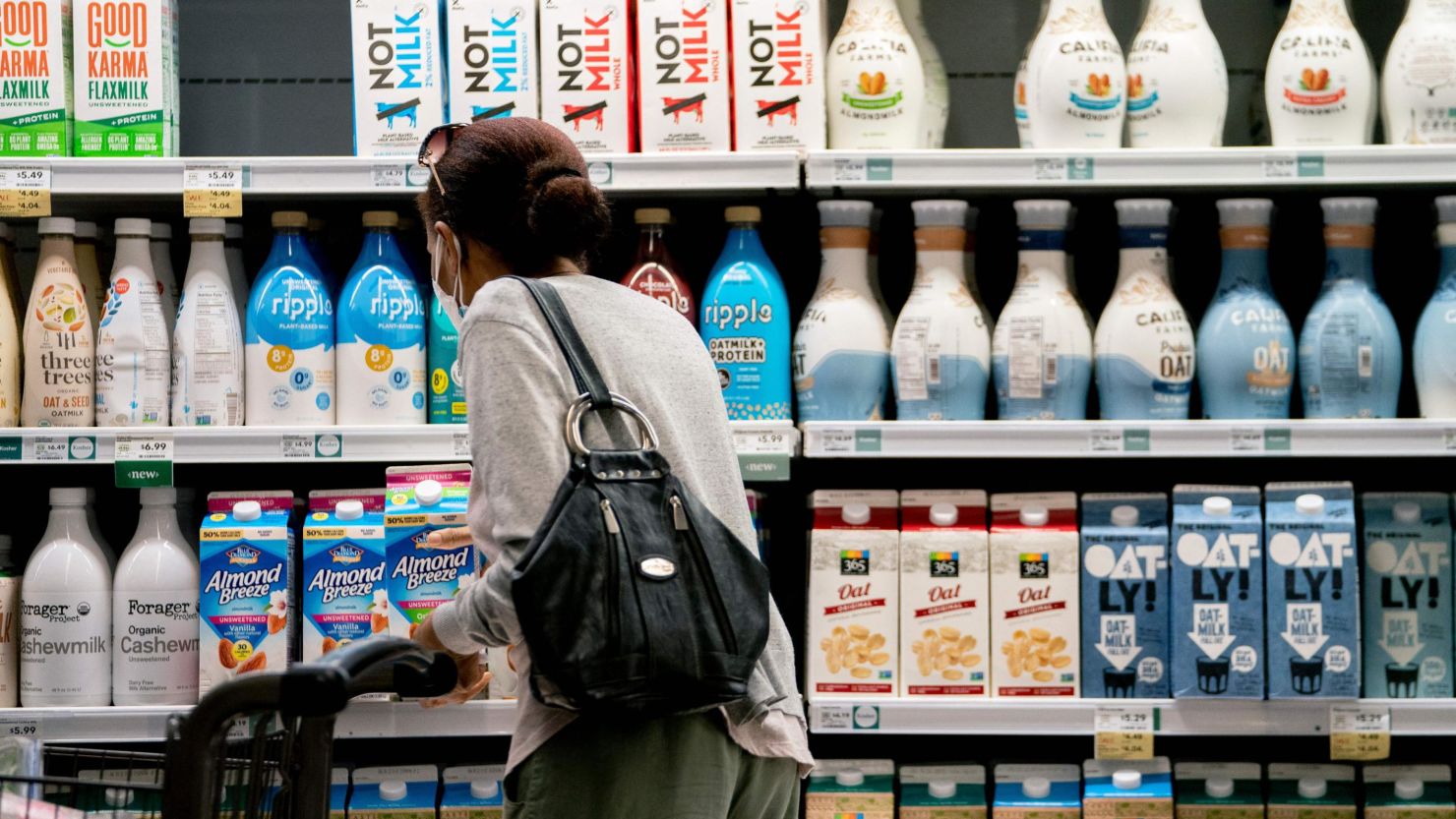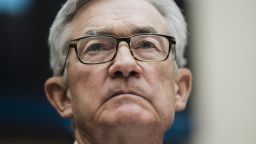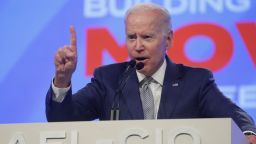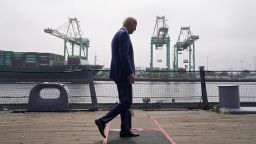In his latest attempt to stem raging inflation affecting almost every American, President Joe Biden has a new target – oil giants that are banking high profits even as gasoline prices at the pump hit record levels.
Biden rebuked the wealthy sector after he announced a trip to Saudi Arabia, which he blasted as a “pariah” nation but is expected to ask to pump more oil to alleviate some of the pressure on Americans as inflation pummels his own approval ratings and the prospects of Democrats in midterm elections. His moves coincide with an expected aggressive interest rate hike by the Federal Reserve on Wednesday, which could help cool the overheating economy but is part of a strategy that also risks tipping it into a recession.
“At a time of war, refinery profit margins well above normal being passed directly onto American families are not acceptable,” the President wrote in a letter dated Tuesday to Marathon Petroleum, Valero Energy, ExxonMobil, Phillips 66, Chevron, BP and Shell.
“There is no question that Vladimir Putin is principally responsible for the intense financial pain the American people and their families are bearing. But amid a war that has raised gasoline prices more than $1.70 per gallon, historically high refinery profit margins are worsening that pain,” he wrote. The President called on oil executives to open up more refining capacity and called on them to explain to Energy Secretary Jennifer Granholm why such capability had been cut since 2020, adding, “The crunch that families are facing deserves immediate action.”
Granholm said on CNN’s “New Day” on Wednesday that the President was “looking at every tool, always,” to cut gas prices and noted he had already released millions of barrels of oil from US strategic reserves. That step, however, has not stemmed repeated escalations in the price of gasoline. Granholm would not say whether Biden backed a surtax on excess profits of oil firms being pushed by some Democrats.
Biden’s gambit is clearly intended to follow up on his vows to make cutting inflation and high prices – which are being fueled by record gas prices at the pump – his No. 1 priority. But it is likely to cause Republicans to accuse him of trying to create a political deflection to mask his inability to make life easier for Americans ahead of the midterm elections in November. The President, often with some justification, has blamed Putin, supply chain crunches triggered by the pandemic and other outside factors for high inflation. But the White House has rejected accusations that his huge stimulus policies in his first year in office are in any way to blame.
The US energy industry quickly rejected Biden’s attempt to saddle it with culpability for higher prices, with American Petroleum Institute President and CEO Mike Sommers arguing instead that the administration’s “misguided policy agenda shifting away from domestic oil and natural gas” had compounded inflationary pressures.
Soaring food prices and record gasoline bills represent a pernicious crisis that afflicts every American, while hurting those most who can least afford to meet the rising cost of living.
The economic storms are especially piercing to personal and national morale because they are piling on a nation already struggling to exit another unusually shared period of pain: a once-in-a-century pandemic.
And they are different from the more familiar anxieties brought on by a regular recession, when millions can lose their jobs but others may be untouched. Every American who eats or travels feels the pinch in this unpleasant period when everyone’s money is disappearing more quickly. And only adults who came of age in the 1970s and 1980s have any experience of the disorientating feeling of always running to catch up as the cost of everyday life seems to go up almost every day.
Beyond the Washington blame game, the most important story lies in the frustration unfolding outside the capital, where families are trimming supermarket bills and using a chunk of their wages just to drive to work.
That frustration translates to very real political consequences. The universal nature of the consequences of high inflation and the inability of either Biden or the Federal Reserve to quickly turn it around make this a rare and intractable challenge for the party in power.
Biden can make only so many speeches empathizing with the plight of families hit by high prices before his failure to change the dynamic makes his words ring hollow.
And given that his White House insisted for months that inflation was a temporary and unique post-Covid-19 side effect, and the Fed was sluggish in addressing the approaching inflation superstorm, the government’s credibility is in deep question.
If it didn’t predict this problem, why should Americans believe it can fix it?
Every day brings more headaches for the White House. Consumer confidence has slumped to a record low since the University of Michigan started collecting such data in a key survey in 1952. Stocks, the cornerstone of retirement savings for many Americans, have tumbled into a bear market, erasing all the gains they had racked up since the President took office. And Biden’s tanking approval ratings show he’s getting the blame and that comparisons to another Democrat – Jimmy Carter, whose presidency dissolved partly due to an inflation nightmare – may not be off base.
Questions about whether the White House understands the economy
It was striking to see Treasury Secretary Janet Yellen admit earlier this month that she had gotten it wrong on inflation after failing to predict outside factors, like the war in Ukraine and supply chain delays, but her comment raises the question of whether the administration is seeing the future clearly now.
While the Fed is expected to make an emergency hike in interest rates of three-quarters of a percentage point on Wednesday, many economists fear its earlier restraint may now force it to throw the economy into a recession to stem surging prices.
A strategy of higher interest rates won’t be painless for Americans either. It will become more expensive, for example, to borrow to buy cars or homes.
The unpalatable economic environment has left Biden in an especially unenviable political position and offered an opening to Republicans, who are hammering away at the elevated cost of living heading into November’s congressional elections. The President made yet another attempt on Tuesday to convince the country that he gets it and cutting inflation is his number one priority.
“So gas is up and food is up, which we’re going to get down come hell or high water,” Biden said, addressing labor unions in Philadelphia. “Inflation – it’s sapping the strength of a lot of families,” he admitted.
But given that inflation and gasoline prices are being driven by forces often outside the President’s control, he looks powerless – always a danger for a commander in chief. And the inflationary cycle puts Democrats in a weak political position only five months before the midterms. Similarly, Biden’s recitation Tuesday of steps that he’s taken to save the economy – such as the American Rescue Plan, which helped millions of Americans get back to work after the pandemic, and his bipartisan infrastructure law – is unlikely to get much traction among voters struggling to fill up their gas tanks.
And when Democrats, pointing to a strong labor market, argue that the economy is really doing well – when the millions think they are struggling – they come across as out of touch. For instance, White House press secretary Karine Jean-Pierre had some justification in saying this week that Americans were “well equipped” to ride out the current challenges, including gas averaging more than $5 a gallon and inflation up 8.6% for the 12 months ending in May. But the argument sets up the kind of opening that even the most incompetent political opponent can easily exploit.
Nuanced arguments made by the White House about how the administration has actually presided over a remarkable economic renaissance also sound discordant.
National Economic Council Director Brian Deese, for instance, acknowledged in an interview with CNN’s Victor Blackwell on Tuesday that there were “real challenges,” including high prices.
But he insisted: “We are moving out of what has been the strongest economic recovery in modern American history to what can be a more stable period of growth, where we don’t have to sacrifice all those economic gains.”
It could get worse
For miserable Americans – and Biden’s political number crunchers – there’s little prospect of quick relief. Oil price shocks caused by the war in Ukraine and the possibility of a ruined harvest there, in one of the world’s top breadbasket nations, could cause new problems in the coming months.
As prices tick up, there is also bound to be more scrutiny over whether the Biden administration’s policies were partly to blame. When inflation was clearly caused by supply chain blockages from the pandemic, the shutdown of manufacturing bases in Asia and suddenly rising demand and diminished supply as America reopened, it was credible to say the health crisis was largely to blame. Similarly, Biden’s success in corralling Western nations into a punishing menu of sanctions, which have cut Russian energy from global markets, were partly to blame for the rise in oil prices.
But at the same time, early in his presidency, Biden injected trillions of dollars into the economy in his pandemic rescue package and infrastructure spending, which is now getting a much closer look. Former Treasury Secretary Larry Summers warned for months that his fellow Democrats in the White House, plus the Federal Reserve, were being complacent about the risk of inflation. He suggested that big stimulus programs could overheat the economy. Now it looks like he was right. His current outlook doesn’t offer much comfort to the White House either.
“I think when inflation is as high as it is right now, and unemployment is as low as it is right now … it’s always almost been followed within two years by … recession,” Summers said on CNN’s “State of the Union” on Sunday.
“I look at what’s happening in the stock and bond markets. I look at where consumer sentiment is. I think there is certainly a risk of recession in the next year.”
The White House, meanwhile, is sticking to its rosier forecasts, despite its proven inability to predict the economic future in an albeit unprecedented time. Biden is doing what he can. His decision to travel to Saudi Arabia next month, a nation he once branded a pariah over its killing and dismembering of dissident and Washington Post columnist Jamal Khashoggi, is motivated by a desire for the kingdom to pump more crude oil in order to ease gasoline prices back home.
In his speech on Tuesday, Biden criticized Republicans for blocking programs that would cut costs in health care, energy and education and would ease the overall financial burden on Americans – even though his plan foundered in the Senate at the hands of a member of his own party worried about inflation, West Virginia’s Joe Manchin.
Biden is also blowing political smoke by attacking the profits of massive oil firms and demanding that corporations pay their fair share in taxes. And he’s beseeching Americans, after years of grinding national crisis, for patience.
“I truly believe we’ve made extraordinary progress by laying a new foundation for our economy, which becomes clear once global inflation begins to recede,” Biden said on Tuesday.
The problem is, millions of Americans are not yet seeing that with their own eyes.
This story has been updated with additional developments.







